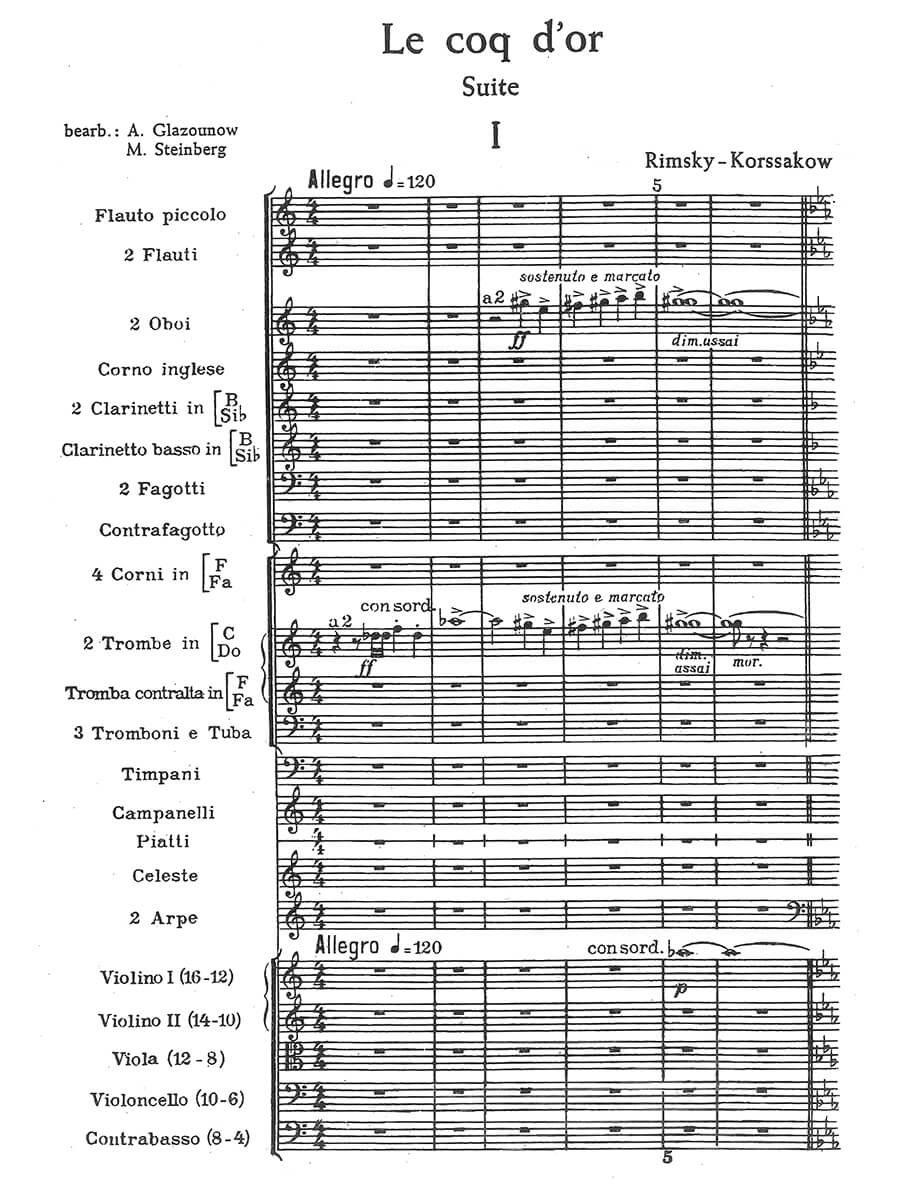Quatre tableaux de l’opéra “Le coq d’or” (compiled by Alexander Glazunov and Maximilian Steinberg)
Rimsky-Korsakov, Nicolai
29,00 €
Nikolai Andreyevich Rimsky-Korsakov – Four Musical Pictures from the Opera The Golden Cockerel
(b. Tikhvin, 18 March. [o.s. 6 March] 1844; d. Leipzig, 21 June [o.s. 8 June] 1908)
(compiled by Alexander Glazunov and Maximilian Steinberg)
King Dodon at home p.1
King Dodon on the March p.36
King Dodon as the Guest of the Queen of Shemakha p.55
The wedding and the lamentable end of King Dodon p.95
Preface
The last years of Rimsky-Korsakov’s life were hardly settled ones. In 1904 Russia had suffered an ignominious and unexpected defeat at the hands of Japan, and the succeeding unrest resulted in the revolution of 1905. The management of the St. Petersburg Conservatoire, where Rimsky worked, threatened that any student who took part in a demonstration would be dismissed. This was too much for the composer, whose political views had always been liberal, and he openly sided with the students – even writing an arrangement of the political song Dubinushka. But the authorities dismissed him and about 100 of the students. Then a student production of one of his operas preceded a demonstration, and the Police banned all performances of his music, causing many staff to resign in protest, including Glazunov and Liadov. Protests took place all over Russia – indeed all over the musical world – and 300 students left the Conservertoire. By December, with Glazunov now in charge of the Conservertoire, Rimsky was reinstated. But the events had left their mark, and he retired in 1906.
In retirement he wrote his last opera, to a tale by Pushkin. The Golden Cockerel (Золотой петушок, Le coq d’or, Der goldene Hahn) was completed in September 1907, but by the following spring it had been refused permission to be performed without substantial changes to the libretto – it seems it was seen as a thinly-veiled attack on the Romanov Monarchy. Rimsky refused to make any such alterations, and enquired about a performance in Paris. He never received the reply for he died just two days later. In the event it was first performed in Russia, on 7 October (o.s. 24 September) 1909 at Moscow’s Solodovnikov Theatre, by the Zimin Opera under Emil Cooper. It was staged in Paris as an opera-ballet (with choreography by Folkine)in 1914; it was also given the same year in London.
Before this, though, Glazunov and Maximilian Steinberg (a pupil of Rimsky’s, and classmate of Igor Stravinsky) had produced this orchestral suite for concert performance. It was published by Bessell in 1908. The editors chose four lengthy and colourful sections of the opera that loosely follow the action. The tradition of making concert suites from operas had been popularised by those from Bizet’s l’Arlésienne (1872) and Carmen (1874), and Rimsky had himself made several suites from his own operas. In the days before recording they represented one of the few ways in which music from new operas could be heard reasonably authentically by the general public.
Phillip Brookes, 2019
The complete score of The Golden Cockerel is also available from MPH (Opera Explorer score 80). For performance material please contact Edition Peters, Leipzig. Reprint of a copy from the Musikbibliothek der Münchner Stadtbibliothek, Munich.
| Score No. | 4075 |
|---|---|
| Special Edition | |
| Genre | Orchestra |
| Size | |
| Printing | Reprint |
| Pages | 142 |
